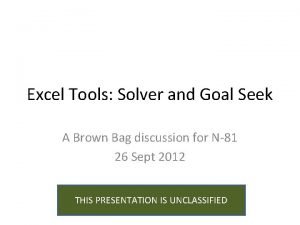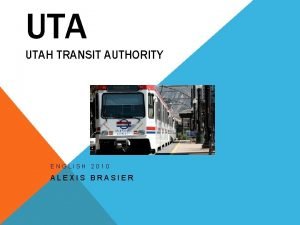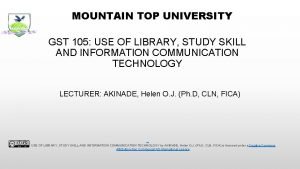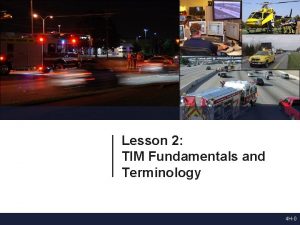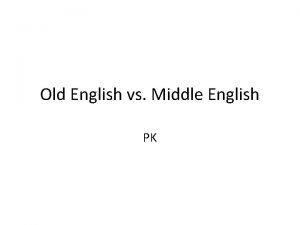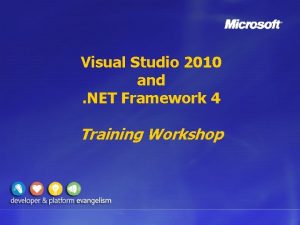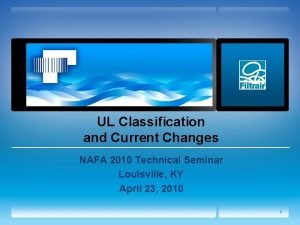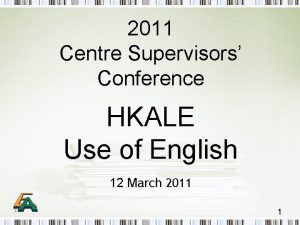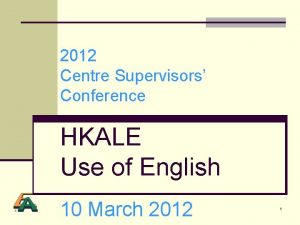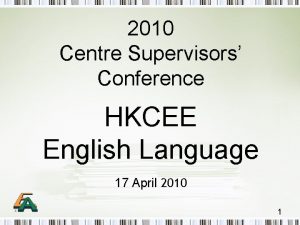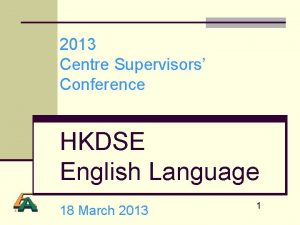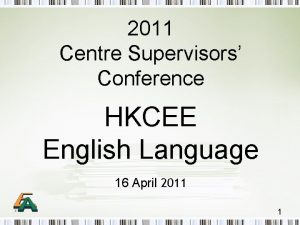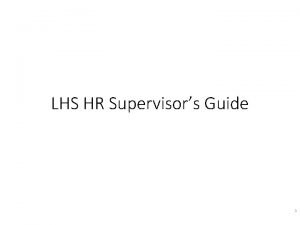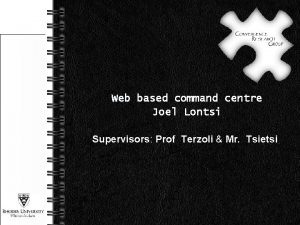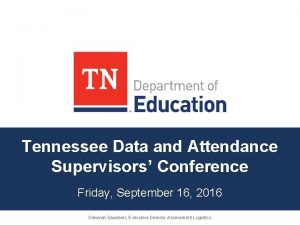2010 Centre Supervisors Conference HKALE Use of English


















































- Slides: 50

2010 Centre Supervisors’ Conference HKALE Use of English 20 March 2010 1

CONTENTS • Important Changes to Exam Proceedings in 2010 • Major Exam Procedures • Highlights of UE Listening Test • Handling of Exam Irregularities • Q&A 2

Important Changes to Exam Proceedings in 2010 3

IMPORTANT CHANGES 1. Sticking of Barcode labels Ø Candidates must affix the barcode labels and write their candidate numbers during the examination time. Ø After the “Time is up” announcement, candidates will NOT be permitted to stick the barcode labels or mark the question-number box. However, they are allowed to write their candidate numbers under the supervision of the invigilator. 4

IMPORTANT NOTES 2. Sitting the Listening Tests Ø Candidates may use radios, Walkmans/Discmans equipped with an FM radio. Ø Other electronic devices such as MP 3 players, bluetooth and i. Pod are not allowed. 5

IMPORTANT NOTES 3. Handling of exam irregularities/ complaints Ø Candidates must lodge their complaints about the centre environment with the centre supervisor at the exam centre. Ø The exam centre should be kept at an appropriate room temperature (i. e. 25. 5 ℃ as advised by the Government). Adjust the room temperature accordingly in case the candidate expresses concerns over it being too low. 6

IMPORTANT NOTES 3. Handling of exam irregularities/ complaints Ø Other complaints and irregularity reports, if any, must be made in writing within one week after the date of the examination. 7

Major Exam Procedures 8

BEFORE THE EXAM Ø Avoid holding activities and using the loudspeaker in the vicinity of the exam venue during exam. Ø Turn down or switch off the school bell and the PA system outside the exam room. Ø Seek the cooperation of other teachers and students in helping to keep the exam venue quiet during exam. 9

BEFORE THE EXAM Ø Upon receipt of the question papers, stamp a school seal on the receipt. Ø Brief invigilators of the exam regulations and procedures (invigilators for Use of English Sections B, C & E should report duties 30 min before the start of exam; invigilators for Use of English Listening Test should report duties at 8: 45 am). 10

BEFORE THE EXAM Ø Distribute the stationery and barcode sheets before admission of candidates. Ø Admit candidates 15 min before the start of exam (for UE Sections B, C & E) / at 9: 10 am (for the Listening Test). Give them sufficient time to check the barcode sheets and exam stationery (e. g. answer books). n Supplementary answer sheets / graph papers are of A 3 size (folded into A 4 size) and should not be torn apart. n Do not use previous years’ answer sheets / graph papers. 11

BEFORE THE EXAM Ø Instruct candidates to check their mobile phones (including the alarm function) and other electronic / communication devices to ensure that they have been switched off. Ø Give them sufficient time to check and switch off their mobile phones. Ø Instruct candidates to put their mobile phones, preferably with the batteries removed, under their chairs in a position clearly visible to the invigilators. 12

BEFORE THE EXAM Ø Before making the first announcement, arrange an invigilator to stay at the entrance of the exam hall and distribute the Mobile Phone Reminder Cards to candidates arriving at the centre after the first announcement. Ø This arrangement is not applicable to the Listening Test. 13

14

BEFORE THE EXAM Ø Check carefully the question paper packets and open them in front of the candidates and the invigilators. Ø Before the start of exam, instruct the candidates to check if there any missing pages in their question books. Ø Instruct the candidates to close their question books upon checking. 15

AFTER THE START OF EXAM Ø Write the actual starting time and the correct finishing time, subject, paper and centre number clearly on the blackboard. Ø Nobody should be allowed to take away the question papers during the entire exam period. 16

AFTER THE START OF EXAM Ø During attendance taking, check whether 1. the photo on the Admission Form / Identity Card resembles the candidate (to reduce the possibility of impersonation); 2. the subject being taken is listed on the Admission Form; 3. the candidate number shown on the Admission Form matches with that on the barcode label. Ø For the Listening Test, attendance taking should be completed before the Test begins. 17

AFTER THE START OF EXAM Ø If a candidate requests to go to the toilet, arrange an invigilator to accompany the candidate and exercise an appropriate degree of supervision. Record the candidate number and time on Report Form SR 4 t. Ø Make sure that early leavers do not remove the question papers and answer scripts from the exam centre (early leave is not allowed in Use of English Section C and Listening Test). 18

AFTER THE START OF EXAM Ø Report irregularities in detail to the HKEAA (e. g. suspected cheating, irregularities concerning mobile phones or electronic / communication devices, subject not listed on the Admission Form, etc. ). 19

END OF EXAM Ø When collecting the answer scripts, check whether the candidates have written their candidates’ numbers on the answer scripts. If not, instruct them to do so on the spot under the supervision of an invigilator. Ø Candidates are NOT allowed to affix barcode labels / fill in the question-number boxes. 20

END OF EXAM Ø Collect all barcode sheets (with/without unused barcode labels) and put them in the Barcode Sheet Envelope. Ø Dismiss the candidates only if the number of scripts collected tallies with the number of candidates present. 21

END OF EXAM Ø Place the answer scripts in the appropriate script envelopes according to the candidate number ranges printed on them. The envelopes must be tied together with a piece of string. Ø In case of an irregularity, follow it up with an invigilator before dismissing all invigilation staff. 22

END OF EXAM Ø Candidates should report any irregularities about the reception in the Listening Test at the examination centre on the day of the examination. To facilitate the follow-up by the HKEAA, the Centre Supervisor / invigilator should provide as many details about the irregularity as possible (e. g. radio reception in the examination room, the environment of the examination room) in the Sessional Report. 23

LISTENING TEST: EXAM PROCEDURES 8: 45 Invigilators report duties at the Centre 8: 45 -9: 00 Briefing to all invigilation staff (including the “Special Room Invigilator”) 9: 00 -9: 10 Hall: Distribute barcode sheets Special Room: Pass question papers, barcode sheets (15 spare) , other exam materials and the sheet on which the best radio frequency for the centre is written to the “Special Room” Invigilator 9: 10 Admit candidates into the exam hall 24

LISTENING TEST: EXAM PROCEDURES 9: 15 Announcement to remind candidates to turn off their mobile phones, put personal belongings under their chairs, check their barcode sheets, etc. 9: 20 -9: 40 Take attendance 9: 30&9: 45 RTHK Radio 2 to broadcast a short announcement to enable candidates to confirm that they have tuned to the correct channel 9: 40 -9: 45 Direct candidates with reception problems to the “Special Room” (changing seats are not permitted); candidates should bring with them their barcode sheets to the “Special Room”. 9: 45 Direct late-comers (arriving at the centre at / after 9: 45) to take the test in the “Special Room” 25

LISTENING TEST: EXAM PROCEDURES 9: 46 Instruct candidates to take off the headphones. Unseal question paper packets in front of invigilators / candidates and distribute the question papers (i. e. question-answer books) 9: 55 RTHK Radio 2 to broadcast “Greensleeves” 10: 00 Exam starts (Before the broadcast of test material, candidates will be instructed to write their candidate numbers on the question-answer book covers, check the number of pages and affix barcode labels on the spaces provided in the question-answer books) 11: 00 End of radio broadcast (end of the test) Collect question-answer books and barcode sheets separately 26

LISTENING TEST: BEFORE THE EXAM • Switch off the school bell and the PA system • Determine the best radio frequency for the centre using a digital radio • Assign one to two classrooms close to the exam hall as “Special Rooms”. Place an ordinary radio or radiocassette player on the teacher’s desk in the “Special Room”. Tune it to RTHK Radio 2. • Arrange a staff to assist the “Special Room” Invigilator during the Listening Test 27

LISTENING TEST: SPECIAL ROOM • In case of candidates entering the “Special Room” before 9: 45 am, switch on the radio. • Switch on the radio at around 9: 45 am even if there is no candidate in the “Special Room”. • Stop taking candidates’ attendance at 9: 55 am. • Candidates who sit the listening tests in the “Special Room” cannot use their own radio with earphones. 28

LISTENING TEST: SPECIAL ROOM • For candidates who go to the “Special Room” after the start of the exam broadcast, if they bring with them the question-answer books, they should continue to use them. • In case the candidates do not bring with them the question-answer books and barcode sheets, they should be given a new question-answer book and a spare barcode sheet. • Distribute the “Special Room Reminder Card”. 29

LISTENING TEST: SPECIAL ROOM • “Special Room” invigilators should be very flexible in handling the exam arrangements for any candidates who arrives just before / after the exam begins. • Record the seats taken by individual candidates in the Special Room by filling in the “LT Special Room Seating Plan”. 30

LISTENING TEST: SPECIAL ROOM • After the collection of answer scripts, check their Admission Forms (original) and Identity Cards (original) of those candidates whose attendance has not been taken before the start of the broadcast (e. g. those arrived at the examination centre after 10 am) and take their attendance. 31

LISTENING TEST: SPECIAL ROOM • If in a rare circumstance the Special Room Invigilator discovers, during collection of the Question-Answer Books, that a candidate has not been given any barcode sheet, the candidate should be given one spare barcode sheet and be asked to write his/her candidate number on the barcode sheet. However, the candidate should not be allowed to affix barcode labels on the Question-Answer Book. The Special Room Invigilator should record the incident on Parts A and D of Report Form SR 4 b. 32

LISTENING TEST: SPECIAL ROOM • On the Sessional Report (Special Room), “Special Room” invigilators should 1. accurately enter the candidates’ arrival time at the “Special Room” and the reasons for attending the “Special Room”; 2. affix individual candidates’ barcode labels in the designated spaces on the Sessional Report; 3. ask the candidates to sign against their candidate numbers after the collection of answer scripts. 33

LISTENING TEST: INFRA-RED SYSTEM • On the day of the test, the Centre Supervisors will receive: 1. an envelope containing several demonstration CDs; 2. question papers in packets of 31 copies; 3. a “confidential” envelope containing 1 examination CD and 1 reserve examination CD; 4. a copy of the tapescript. 34

LISTENING TEST: INFRA-RED SYSTEM • • • Play the demonstration CD during attendance taking to enable candidates to check the headphones and receivers. Entertain candidates’ requests for change of headphones and receivers. After attendance taking, stop playing the demonstration CD at around 9: 46 am. 35

LISTENING TEST: INFRA-RED SYSTEM • • After the distribution of question-answer books, instruct candidates to put on their headphones again. Play the demonstration CD to give them the last chance to test the headphones and receivers. When all candidates are satisfied with the reception, open the examination CD packet in front of the invigilators and candidates. Ask the technician to start playing the examination CD. 36

LISTENING TEST: INFRA-RED SYSTEM • • • The reserve CD should not be used unless the examination CD cannot function normally. The examination CD should be played once only. Do not start playing the examination CD before 10: 00 am. Centre Supervisors should refer to the tapescript concerning the progress of the test. 37

LISTENING TEST: INFRA-RED SYSTEM • Special Room – The Listening Test will be broadcast via the portable radio (except for a few centres). – Switch on the radio at around 9: 45 am even if there is no candidate in the “Special Room”. 38

Handling of Exam Irregularities 39

HANDLING OF EXAM IRREGULARITIES 1. 2. 3. 4. 5. 6. 7. Late arrivals Early leavers Candidates requesting to go to the toilet Mobile phone irregularities Suspected cheating Irregularities concerning barcodes Irregularities concerning the Listening Test conducted in the “Special Room” 40

LATE ARRIVALS • Remind the candidates to switch off the mobile phones (distribute the Mobile Phone Reminder Cards) (not applicable to the Listening Test). • After they have been seated, remind them to place the mobile phones under their chairs in a position clearly visible to the invigilators. • Check the candidates’ Admission Forms and barcode labels at an appropriate time. • Amend the attendance record. • No extra time should be given to make up for the time lost. • No need to report cases of late arrivals. 41

EARLY LEAVERS • UE B & E: candidates can leave during the period from 30 min after the start of exam to 15 min before the end of exam. • UE A & C: early leave is not allowed. • Check whether early leavers have written their candidate numbers, affixed barcode labels and marked the question number boxes. • Early leavers cannot take away the question papers from the exam centre. 42

EARLY LEAVERS • The answer scripts and question papers of early leavers should be collected together with those of other candidates at the end of the exam. • Candidates requesting to leave outside the permitted time should fill in Report SR 4 g. • Candidates will be downgraded if they leave the exam centre without the permission of the CS. 43

CANDIDATES REQUESTING TO GO TO THE TOILET • An invigilator (preferably of the same gender) should accompany the candidate and exercise an appropriate degree of supervision. • Record the candidate number and time on Report SR 4 t. • In case of irregularities, report them on SR 4 g. • Handle the irregularities in the presence of an invigilator. • Under no circumstances should the body or personal belongings of a candidate be searched. • No extra time should be given to make up for the time lost. 44

MOBILE PHONE IRREGULARITIES • Locate the source of the ringing sound and instruct the candidate to switch off the mobile phone at once. • Record the time and other details on Report SR 4 p. In case the mobile phone is in the operating mode, ask the candidate to show the call / SMS / MMS log after the exam. • No further action should be taken if the source of the ringing sound cannot be located and the ring stops. 45

SUSPECTED CHEATING • Examples: copying from the answer scripts of other candidates, obtaining unfair assistance from books, communicating with other people, using a mobile phone in the toilet. • Remove the notes, books or pieces of papers, etc. (except for essential items). • Handle the irregularities in the presence of an invigilator. • For doubtful cases (including a candidate reporting another candidate cheating), avoid disturbing the candidate during the exam. Inform the candidate after the exam to complete a report. 46

IRREGULARITES CONCERNING BARCODES • The following candidates will be given spare barcode sheets: Ø candidates whose personalised barcode sheets are not available at the centre (e. g. for wrong centre candidates); Ø candidates whose personalised barcode sheets are damaged or found to have incorrect information. • In case of insufficient barcode labels, candidates should be asked to write their candidate numbers on their answer scripts in the designated spaces for barcode labels. • The above cases should be reported on Report SR 4 b. The answer scripts concerned and Report SR 4 b should be placed in the “Envelope for Special Reports and Related Scripts / Answer Sheets”. 47

IRREGULARITES CONCERNING BARCODES • If a candidate is found to have removed unused barcode labels (including barcode labels from previous examination sessions) on the personal belongings (including barcode labels stuck on the Admission Form), the case should be reported on Report Form SR 4 g. The materials with the barcode labels should be copied and attached to the Report Form. 48

IRREGULARITIES CONCERNING THE LISTENING TEST CONDUCTED IN THE “SPECIAL ROOM” • • In case a candidate, despite being reminded by the Special Room Invigilator, continues to use his / her own radio with earphones, let the candidate use them for the remaining time. Do not disturb the candidate. After the Listening Test, ask the candidate to fill in Report Form SR 4 g. 49

OTHER USEFUL INFORMATION HKEAA website www. hkeaa. edu. hk Schools and Teachers’ Corner Information for Teachers www. hkeaa. edu. hk Schools and Teachers Public Examinations Communication & Support System (PECSS) and Attendance & Script Tracking System (ASTS) 50
 Hkale chemistry
Hkale chemistry Hkale chemistry
Hkale chemistry Tennessee attendance conference
Tennessee attendance conference Customer experience management conference 2010
Customer experience management conference 2010 Eeo compliance training for managers and supervisors
Eeo compliance training for managers and supervisors Allergy therapy makes bees go away
Allergy therapy makes bees go away Ergonomics awareness training for supervisors
Ergonomics awareness training for supervisors Ergonomics awareness training for supervisors
Ergonomics awareness training for supervisors Compliance training for managers
Compliance training for managers Situational frontline leadership
Situational frontline leadership Danger zones for supervisors
Danger zones for supervisors Tccg ground
Tccg ground Bath county board of supervisors
Bath county board of supervisors Pa association of township supervisors
Pa association of township supervisors Pa state association of township supervisors
Pa state association of township supervisors Gp supervisor requirements
Gp supervisor requirements Valencia dermatology congress
Valencia dermatology congress Centroid engineering mechanics
Centroid engineering mechanics Center of gravity for different shapes
Center of gravity for different shapes Goal seek automates the trial-and-error
Goal seek automates the trial-and-error English 2010 slcc
English 2010 slcc Language english
Language english Yesterday
Yesterday Part 2 use of english
Part 2 use of english Lejac residential school
Lejac residential school National tim responder training test answers
National tim responder training test answers Cae reading and use of english
Cae reading and use of english Which countries use british english
Which countries use british english Scotty weems
Scotty weems Gst 105 use of english pdf
Gst 105 use of english pdf English grammar in use oxford
English grammar in use oxford Uses of semicolon examples
Uses of semicolon examples What is direct method in elt
What is direct method in elt Lane designation terminology
Lane designation terminology Pink dress
Pink dress Think in english speak in english
Think in english speak in english Spoken english and broken english summary
Spoken english and broken english summary Tumoxan
Tumoxan Father of tragedy
Father of tragedy Old english vs modern english
Old english vs modern english American vs english words
American vs english words Motorway stressed syllable
Motorway stressed syllable Old english vs modern english
Old english vs modern english Do you speak english reported speech
Do you speak english reported speech 2000 in old english
2000 in old english Spoken english and broken english summary
Spoken english and broken english summary Motorway stressed syllable
Motorway stressed syllable Small business server 2010
Small business server 2010 Visual studio 2010 training
Visual studio 2010 training Ul 2010
Ul 2010 Microsoft visual c express 2010
Microsoft visual c express 2010



















